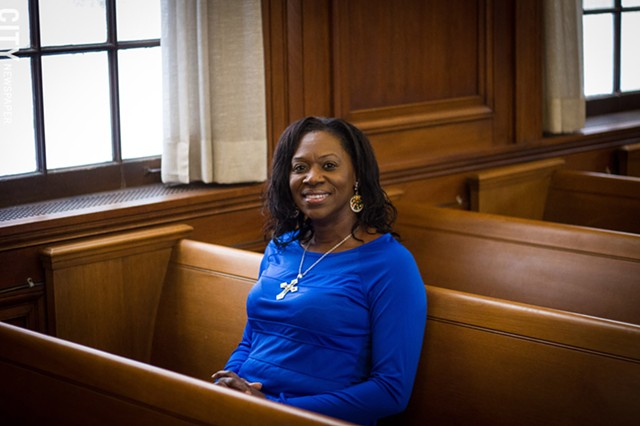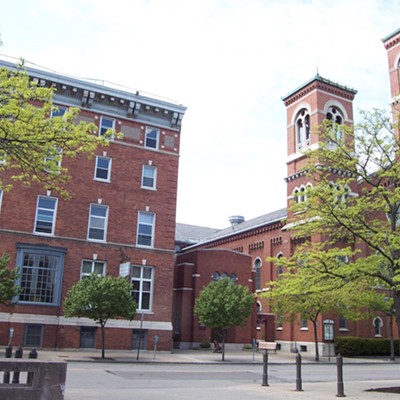[
{
"name": "500x250 Ad",
"insertPoint": "5",
"component": "15667920",
"parentWrapperClass": "",
"requiredCountToDisplay": "1"
}
]
Not everyone can talk about God and get others to listen. But there's something about the Rev. Myra Brown's voice that perfectly suits her line of work; her calm and reassurance connects.
Brown, 51, is a fixture in the Rochester-area spiritual scene, spanning everything from being a young altar worker at black Catholic revivals to an anti-racism community activist and deacon at Spiritus Christi.
And recently, Brown was ordained at Spiritus Christi: becoming the third African-American woman in the US to become a Catholic priest.
Spiritus Christi is as an independent Catholic church, which means that Brown's ordination is not recognized by the Vatican. But that has only energized her to further advocate for the women priest movement, which despite some harsh reprisals from Rome — even Pope Francis firmly rejects the idea — is gaining momentum.
In recent interviews, Brown shared her views about the Catholic Church and inclusivity, women in the priesthood, abortion and the pro-choice movement, and her decision to become a priest.
The following is an edited version of those conversations.
CITY: What made you decide to become a Catholic priest, knowing that the idea offends many Catholics?
Brown: I was praying and asking God, "What do you mean you've called me to preach and teach your word in the Catholic system?" I'm thinking, I'm black and I'm a woman, I'm in the Catholic Church and they don't do that.
Your question assumes that I chose where I am. I didn't; God chose me. My calling came to get me and it took me to the Catholic Church. I went to where I was led.
Ultimately, the question is who is in charge of ordination? Who's in charge of our lives? Are we in charge or is God in charge? If God is in charge, then we have to let God lead us.
If God decides "I want to ordain 10 women this year to the Catholic Church," are we going to refuse God and say, "No, God, because our tradition won't let us do that"?
What do you say to those Catholics who say that there is no precedent for women in the priesthood?
There actually is a precedent. The Vatican knows the history of women priests in the early centuries. There's also evidence in Scripture of women who were part of the apostolic ministry.
The Bible talks about the letters of Timothy and Paul, about the house churches, and the women who were leading those house churches.
Jesus led house churches. If you read the Scriptures, Jesus is preaching when he's brought a paralyzed man; it's a house church that they're in. They lower the man through the roof and Jesus heals him.
This notion that there were never women priests, it's a failed notion. Interpretation matters. It matters who gets to tell the story. Men in the Catholic Church, particularly in Rome, don't want to talk about the reality that these are male-centered views that are designed to protect their interests.
The whole Jesus movement starts with the angel going to Mary, a woman.
Sometimes we develop traditions that don't have anything to do with the life and teachings of Jesus; they have to do with cultural tradition.
When the men from past centuries began to be part of the apostolic ministry and they decided that instead of it just being about service and that it was about an office, prestige, status, and power — you see women over the centuries get squeezed out.
Then you get a new narrative that is written as if they were never supposed to be part of it at all.
Even though Pope Francis has softened some of the church's teachings concerning the LGBTQ community, he still firmly opposes marriage equality. Does the Vatican not see that even as Catholic churches, schools, and hospitals close, that the lack of inclusivity is an issue?
I think change will come. I run into more and more people who tell me they were Catholics at one time, but they aren't any longer. And what they all seem to have in common is some experience of exclusion, oppression, or they feel that they were taken for granted.
I recently met a couple that said they were having their child baptized and they wanted the parish priest to do it. He decided to defer it to a deacon, a person they had never met. They objected and pushed it. He did decide to do it, but he performed it with such anger. That was the last time they went back to that church.
What do you say to conservative Catholics who are opposed to abortion and vocally pro-life, but are silent when it comes to supporting common sense gun legislation? How can you be pro-life and support repealing the Affordable Care Act? If you're pro-life wouldn't you also be pro Black Lives Matter?
The conversation around pro-life and pro-choice has been reduced to some kind of political agenda. I have often said to people that God is both pro-life and pro-choice, and so am I.
If you're pro-life, you have to be for life from the beginning of life to the end of life. You have to be committed to making sure that if life happens, that we provide everything that life needs to thrive. If we're not willing to do that, I don't know that we're really pro-life.
We need to make sure that when children come, they have good child care, education, nutritious food, and health care. We can't accept poverty because poverty is not pro-life.
We can't just stop at an issue like abortion. Life doesn't only begin and end with abortion. We have to bring war and militarization into that discussion.
If we're going to really talk about pro-life, we have to take everything that has the potential to threaten life and to snuff out life and re-evaluate it. That would include much more than abortion.
Why are so many public and social institutions being challenged, whether it's public education, law enforcement, the justice system, and even organized religion?
Jesus was full of questions and I think we have to question, too. Jesus at 12 years old was debating sacred text. When he was lost for three days, they found him in the temple questioning the religious teachers of his day. They were flabbergasted that this kid was challenging them.
I think if we keep questioning, we will end up with the institutions that we want.
Speaking of...
-

Pride parade and festival to return to Rochester
Feb 1, 2022 -

A darker Amanda Lee Peers comes into the light with 'Sinner'
Mar 4, 2021 -

The good shepherd of Linden Street
Feb 1, 2021 - More »
Latest in News
More by Tim Louis Macaluso
-

RCSD financial crisis builds
Sep 23, 2019 -

RCSD facing spending concerns
Sep 20, 2019 -

Education forum tomorrow night for downtown residents
Sep 17, 2019 - More »






